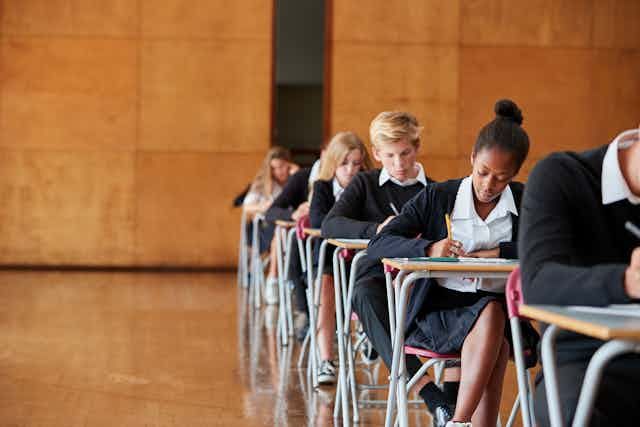The number of students achieving GCSEs in technical and creative subjects along with religious studies (RS) has declined yet again, according to provisional data. This is a trend that has been happening since education reforms in 2010 – which led to a narrowing of the curriculum.
In RS, for example, the total number of students taking the subject at GCSE level fell from 253,712 in 2017 to 229,189 in 2018. And 701 schools have stopped entering students for GCSE RS altogether.
A report: GCSE Religious Studies at a Crossroads, which is based on recent research carried out by Liverpool Hope University’s Centre for Education and Policy Analysis, draws on data from the Department for Education’s school census. And it highlights a real risk of the subject being pushed to the margins.
Perhaps more troubling though is that the report also highlights a social class divide. As the research found that students in schools with higher than average numbers of disadvantaged pupils are less likely to be offered religious studies at GCSE.
This is a story echoed elsewhere, in the decline in arts GCSE and A-levels and the steady but steep decline in BTEC vocationally related qualifications. And it seems to blame for these changes is the arrival of the English Baccalaureate (Ebacc) – a set of subjects at GCSE that are said to keep “young people’s options open for further study and future careers” – but which appears to do the opposite.
Squeezed out
The Ebacc was first introduced in 2010 as a performance measure, and in 2015 the then secretary of state for education, Nicky Morgan, announced the government’s aim for 90% of state school students to take it by 2022. The Ebacc is not a qualification in itself, students receive no certificate for gaining GCSE passes in English, maths, a science, history or geography, and a language. Schools value it because it is used to produce league tables of schools.
As soon as the Ebacc was unveiled, it was warned that such a small list of subjects would undoubtedly lead to curriculum narrowing. And it seems this has been the case: 2019 data shows that entries in non-EBacc subjects decreased (by 9%) compared to 2018. This continues a trend seen over the past five years. Particularly affected are design and technology (22% down since 2014 and engineering (37% down). GCSE Music has also seen a 24% drop in the nine years since the introduction of the EBacc.

This narrowing in the curriculum has a knock-on effect on the options students can then take for the future. In the case of religious studies, there was a 22% fall in A-level entries in 2018, with a further 5% drop this year. There’s also been a dramatic decline in university entries for theology and religious studies and a fall in entries to study music of 25% since 2015.
Limited choice
Research published last year by Sussex University, found that even in the early years of a child’s secondary school education, more time was being devoted to EBacc subjects, at the expense of subjects such as music and RS. And this, of course, has a knock-on effect – with pupils less likely to choose these subjects at GCSE.
There have been concerted efforts by the religious studies teaching community and sympathetic calls to rejuvenate the subject, but the issue at stake is bigger than religious education.
Other social science subjects, such as citizenship and PSHE (personal, social and health education), have also had their curriculum time slashed to make way for EBacc and other subjects – as short courses no longer count in schools’ attainment measures. This comes at the same time that citizenship and civic education are being drawn upon to tackle wider societal problems in countering violent extremism and knife crime – as well as to tackle the mental health epidemic.
Narrowing curriculum
The government has rejected these claims, but pressure for change is mounting. A recent letter, signed by three former education secretaries and two former Ofsted chiefs called for the end of the EBacc.
Ofsted has also raised concerns the Ebacc is dominating the curriculum in secondary schools. It has a new inspection framework from September and will be judging the “intent, implementation and impct” of the schools curriculum. They say the curriculum must not be narrowed. And that the EBacc may be at the heart of the curriculum, but is not meant to be the whole body of it.
Indeed, the list of EBacc subjects does not represent a core of academic subjects. And religious studies, music and other arts subject continue to be a favourable gateway to university and jobs. The Russell Group of universities, for example, has made it clear that religious studies A-level provides “suitable preparation for entry to university generally”, and both Oxford and Cambridge University include religious studies in the top level listof “generally suitable arts A-levels”.
In fact, almost 21% of students admitted to Oxford University to study English and 13.5% admitted to study history in 2015 had a religious studies A-level – more than those with economics, physics and business studies A-levels.
But while it’s clear that religious studies, arts and technical subjects still have a role to play, both in terms of university applications and wider career options for students, it seems that, as things stand, the school curriculum won’t be reflecting that.

